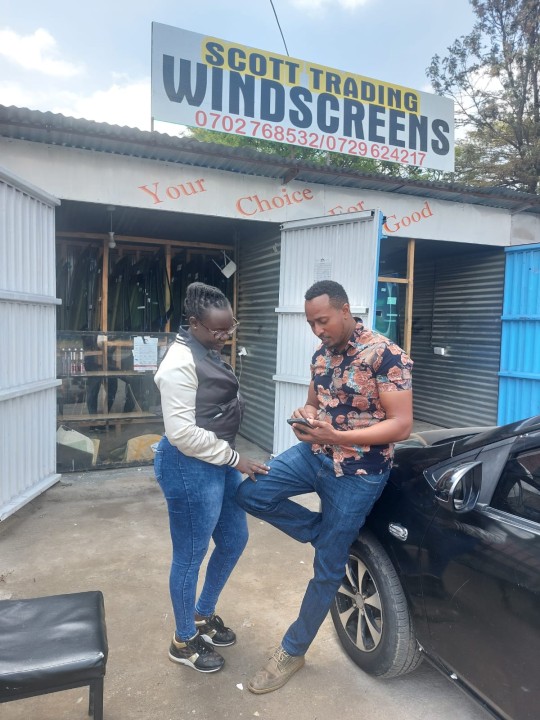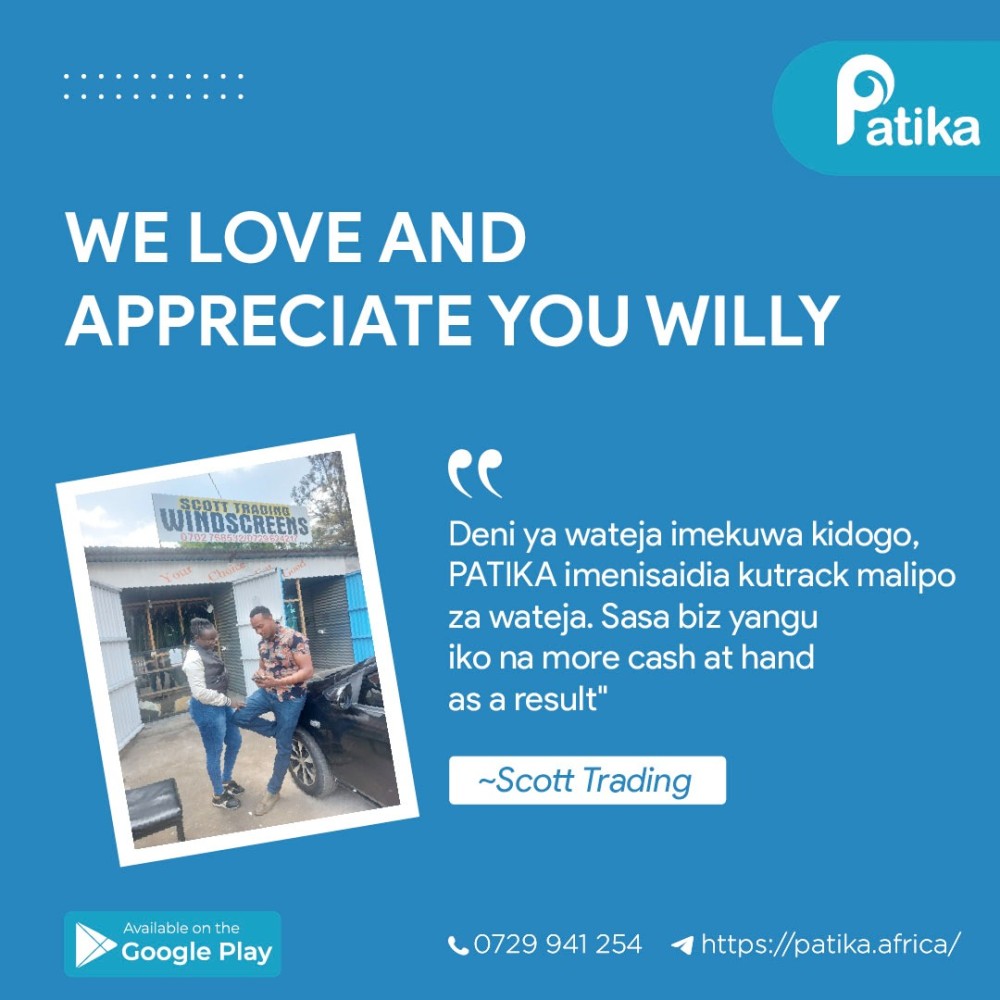
What would you do if you went to your bank and applied for a loan to expand your business but they started asking for unfair terms, high interest rates and security, like your car, despite your cash flow being high enough to sufficiently afford the installment payments without burden?
In the calm streets of one of the residential estates of the city, Willy’s phone is buzzing with calls. Most of them are customers who are in need of his services and products. Within just 2 years, he has built a brand – Scott Trading – as one of the most trusted car windscreen sellers in Nairobi and has clients both within and outside the city. He quickly welcomes us and we get to have a chat for the next hour or so where he tells us about his business, his clients, how he found out about Patika and what impact it has had on his business.
“Most of my customers are garages and insurance companies but I also have walk-in customers. When your car’s windscreen is broken and you go to claim the insurance, they’ll get the windscreens from us, we install it for you and then wait for 90 days on average for the insurance company to pay us.” He narrates. In some instances, a person may take a car directly to a garage for windscreen replacement but doesn’t have money to pay. The garage will then go to Willy and get a windscreen on credit and when the garage gets paid by the car owner, they’ll then pay Willy for the cost of the windscreen. We wonder and ask how he decides on which garage to sell to on credit to minimize his risk considering all this is informal debt and there is no collateral or formal agreement signed. “It’s all about relationships,” He says. “I must have known you and you must have been my client for quite some time, sometimes even at least a year. It also depends on how you’ve been paying back credit sales in the past.”
This may seem foreign to people from other countries; while we were in San Francisco, one of the surprising things other founders struggled to understand is how one can just sell their product and rely on trust to get paid later on. Why not use credit cards? We don’t do credit cards in Kenya, and maybe Africa in general. Informal credit is powered by relationships and the trust that holds those relationships together. Even so, once in a while, such relationships are strained and the trust broken when either party fails to meet their end of the bargain. “Some of my clients have failed to pay me for over a year now and I just had to write off their debts.” Willy tells us, an experience that 90% of small businesses in Africa are familiar with and one of the things that motivated us to found Patika.

At Scott Trading, Willy and his business partner are so held up with their customers that they simply don’t have enough time to follow up on their pending payments. The records were held in physical books that made reconciliations and knowing real time customer balances a real headache and the lack of consistent follow ups led to low collections which impacted their cash flow. “When you haven’t collected pending payments in time, you find it hard to also sell to more customers on credit which means losing some of those customers.” He tells us, “And that’s why when I saw Patika, it was like a Eureka moment to us.” Willy says that with Patika, it’s now a lot easier for them to track part payments because not everyone pays their full balance at once, it’s also easier to track real time customer balances, collect payments and generally, his cash flow has significantly improved.
Nothing makes us happier than hearing that a business has reduced their losses from non payments or that their cash flow has increased. This is because cash flow constraint is the number one reason for closure of small businesses in Africa. In fact, as high as 400,000 new businesses in Kenya alone close down within just 2 years of operation mostly due to cash flow constraints. That’s over a million individuals affected and potentially drawn back to poverty. “How can you help us improve our receivable collection processes? Sometimes we just fail because we don’t have enough knowledge.” Willy asks in a curious tone. Indeed, capacity building is one of the things we can do to eradicate poverty under SDG1: No Poverty. Based on questions like these, Patika has improved its product offering to empower the businesses to collect more but the work is still not over as we have a number of items lined up to help our businesses have more cash.
What happens when you need extra capital injection into the business but can’t get it because the banks just won’t give it to you or if they do, the terms are unfavorable or the interest too expensive? Willy has had a brush with this harsh reality when his bank couldn’t give him a loan and another bank demanded that he moves his account to bank with them. As a result, he had to abandon his plans of expanding the business. He is not alone; the SME Forum estimates that as high as 53% of the MSMEs in Africa are financially constrained – which means that they can’t easily get loans from financial institutions when they need it – with the finance gap standing at $331B.

Nairobi is known as the Silicon Savannah with a booming tech startup scene and cool international tech companies like Google but it is the stories of people like Willy that warm my heart the most. They represent 80% of the employment opportunities in the region and are the backbone of the African economy. We are pleased to serve Willy and and all the other small business owners like him and to help relieve the pain of cash flow constraints that threaten to kill their businesses.
